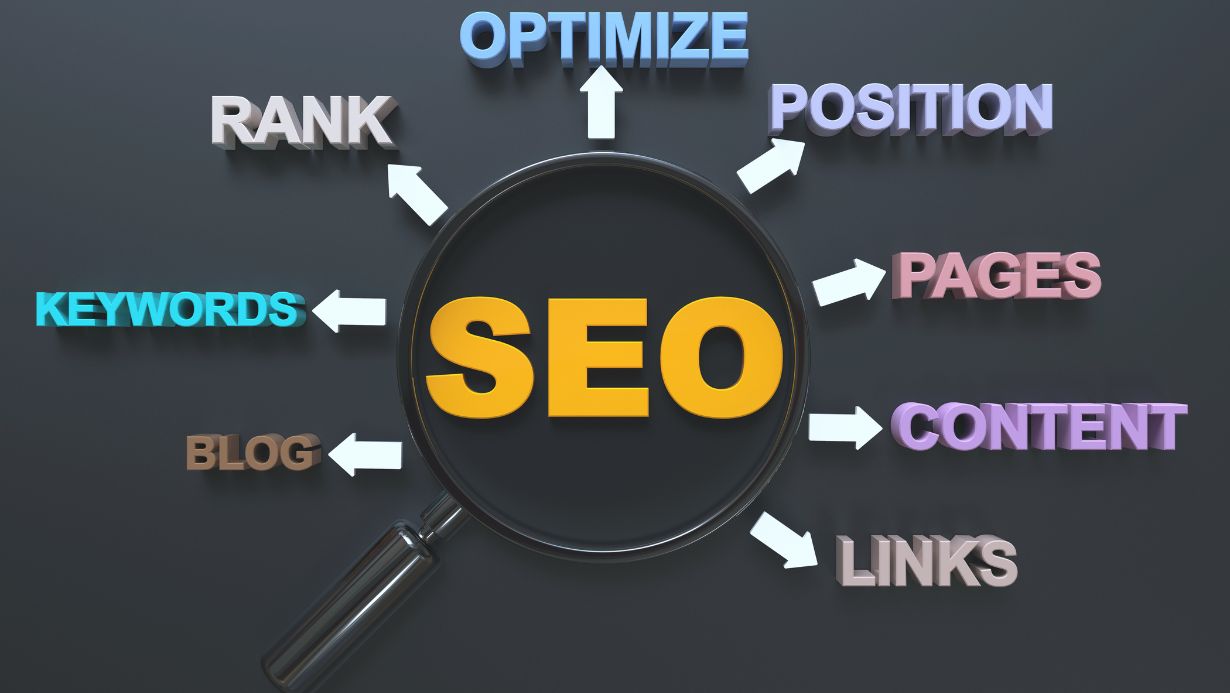The Power of Organic Search Engine Optimization: Boost Your Online Visibility Naturally!
Are you looking to supercharge your online visibility? Look no further than organic search engine optimization (SEO)! With its powerful and natural approach, organic SEO can help you climb the search engine rankings and attract more organic traffic to your website.
Unlike paid advertisements or sponsored content, organic SEO focuses on enhancing your website’s visibility through editorial tactics such as keyword optimization, content creation, and link building. By following search engine guidelines and providing valuable, relevant information to your audience, organic SEO allows your website to rise to the top naturally.
Harnessing the power of organic SEO not only improves your search engine rankings but also establishes credibility and trust with your target audience. By appearing higher in organic search results, you send a message to users that your website is authoritative and trustworthy.
So, if you’re ready to boost your online visibility naturally, it’s time to embrace the power of organic search engine optimization. With the right strategies and a commitment to quality content, you can increase your website’s exposure and attract more potential customers. Don’t wait any longer – start optimizing your website today!

Understanding organic search engine optimization (SEO)
Organic search engine optimization (SEO) is the process of improving the visibility and ranking of a website in the unpaid, natural, or earned search engine results pages (SERPs). Unlike paid advertising, organic SEO focuses on optimizing various aspects of a website to make it more appealing and relevant to search engines, ultimately leading to higher organic search rankings.
At the core of organic SEO is the understanding that search engines, such as Google, Bing, and Yahoo, use complex algorithms to crawl, index, and rank websites based on a variety of factors. These factors include the website’s content, structure, technical performance, and the quality and quantity of external links pointing to the site. By strategically addressing these elements, businesses and website owners can enhance their online visibility and drive more targeted, organic traffic to their websites.
Organic SEO is a long-term, ongoing process that requires a deep understanding of search engine algorithms, user behavior, and industry-specific best practices. It involves a range of techniques, including keyword research, on-page optimization, content creation, link building, and technical website improvements. By consistently implementing these strategies, businesses can establish a strong online presence and increase their chances of appearing at the top of the search engine results, ultimately driving more qualified leads and sales.
Unlike paid advertisements or sponsored content, organic SEO focuses on enhancing your website’s visibility through editorial tactics such as keyword optimization, content creation, and link building. By following search engine guidelines and providing valuable, relevant information to your audience, organic SEO allows your website to rise to the top naturally.
Harnessing the power of organic SEO not only improves your search engine rankings but also establishes credibility and trust with your target audience. By appearing higher in organic search results, you send a message to users that your website is authoritative and trustworthy.
So, if you’re ready to boost your online visibility naturally, it’s time to embrace the power of organic search engine optimization. With the right strategies and a commitment to quality content, you can increase your website’s exposure and attract more potential customers. Don’t wait any longer – start optimizing your website today!
The importance of organic SEO for online visibility

In today’s digital landscape, where the majority of consumers turn to search engines to find products, services, and information, having a strong online presence is crucial for businesses of all sizes. Organic SEO plays a vital role in ensuring that your website is visible and accessible to your target audience, helping you reach potential customers and drive valuable traffic to your online properties.
One of the primary reasons why organic SEO is so important is that it allows you to tap into the vast pool of users who are actively searching for your products or services. When your website appears at the top of the search engine results, it not only increases the likelihood of users clicking on your listing but also establishes your brand as a credible and trustworthy resource. This, in turn, can lead to increased brand awareness, higher engagement, and ultimately, more conversions and sales.
Moreover, organic SEO is a cost-effective way to build long-term, sustainable growth for your business. Unlike paid advertising, which requires ongoing investment to maintain visibility, organic SEO efforts can continue to pay dividends long after the initial implementation. By optimizing your website and creating high-quality, valuable content, you can gradually improve your search engine rankings and attract a steady stream of organic traffic, without the need for constant ad spending.
If you want to improve your organic traffic through SEO
Organic SEO vs. paid advertising
While both organic SEO and paid advertising can be effective in driving website traffic and generating leads, they differ significantly in their approach and long-term impact. Understanding the key distinctions between these two strategies can help you make informed decisions about your digital marketing efforts.
Paid advertising, such as PPC (pay-per-click) campaigns or social media ads, offers a more immediate and controlled way to drive traffic to your website. By bidding on specific keywords or targeting specific demographics, you can quickly get your message in front of potential customers. However, this visibility is often short-lived, as your ads will only be displayed as long as you continue to pay for the placement.
In contrast, organic SEO is a more long-term and sustainable approach to increasing your online visibility. By optimizing your website’s content, structure, and technical elements, you can gradually improve your search engine rankings and earn a prominent position in the organic search results. This not only leads to a steady stream of targeted traffic but also helps to build trust and credibility with your audience, as they perceive your website as a valuable and authoritative resource.
The benefits of organic SEO

Organic search engine optimization offers a multitude of benefits that can have a significant impact on your business’s online success. Here are some of the key advantages of investing in organic SEO:
- Increased Visibility and Traffic: By improving your website’s ranking in the organic search results, you can attract more qualified and targeted traffic to your online properties. This increased visibility can lead to a higher number of potential customers discovering your products or services.
- Cost-Effectiveness: Organic SEO is a long-term, sustainable strategy that can provide a high return on investment (ROI) over time. Unlike paid advertising, which requires ongoing investment, the benefits of organic SEO can continue to pay dividends long after the initial implementation.
- Improved Brand Credibility: When your website appears at the top of the search engine results, it sends a strong signal to users that your business is reputable, trustworthy, and an authority in your industry. This can help to build brand trust and enhance your overall online reputation.
- Targeted Lead Generation: Organic SEO allows you to attract users who are actively searching for the products or services you offer, increasing the likelihood of converting them into qualified leads and paying customers.
- Competitive Advantage: By consistently implementing effective organic SEO strategies, you can gain a competitive edge over your industry peers, as your website becomes more visible and accessible to your target audience.
- Long-Term Sustainability: Unlike paid advertising, which can be quickly turned off, the benefits of organic SEO can continue to drive traffic and leads to your website for an extended period, providing a more stable and sustainable source of online growth.
By harnessing the power of organic SEO, you can unlock a wealth of opportunities to enhance your online visibility, attract more qualified traffic, and ultimately, drive business growth and success.
The basics of organic SEO: keyword research and on-page optimization
At the heart of any successful organic SEO strategy lies the foundation of effective keyword research and on-page optimization. These two core elements work together to ensure that your website is optimized for the right search queries and provides a seamless user experience for your visitors.
Keyword Research:
Keyword research is the process of identifying the terms and phrases that your target audience is actively searching for on search engines. By understanding the specific keywords and search queries that are relevant to your business, you can create content and optimize your website to better match the user’s intent. This involves analyzing search volume, competition, and the commercial intent of the keywords to determine the most valuable opportunities.
Effective keyword research not only helps you identify the right keywords to target but also provides valuable insights into your audience’s search behavior and the overall competitive landscape. By incorporating these targeted keywords into your website’s content, meta tags, and other on-page elements, you can improve your chances of ranking higher in the search engine results and attracting the right kind of traffic to your online properties.
On-Page Optimization:
Once you have identified the relevant keywords, the next step is to optimize your website’s on-page elements to ensure that search engines can easily understand and index your content. On-page optimization encompasses a range of tactics, including:
- Title tag optimization: Crafting compelling and keyword-rich title tags that accurately reflect the content of each page.
- Meta description optimization: Creating engaging meta descriptions that encourage users to click through to your website.
- Heading structure (H1, H2, H3, etc.): Organizing your content with clear and relevant headings to improve readability and search engine understanding.
- Content optimization: Incorporating target keywords naturally throughout your website’s content, while ensuring that the information is valuable and relevant to your audience.
- Image optimization: Optimizing image file names, alt text, and captions to improve the search engine’s understanding of your visual content.
- Internal linking: Establishing a well-structured internal linking system to help search engines navigate your website and understand the relationships between your pages.
By consistently applying these on-page optimization techniques, you can create a user-friendly and search engine-friendly website that is more likely to rank higher in the organic search results, ultimately driving more qualified traffic to your online presence.
Off-page optimization strategies for organic SEO

While on-page optimization is crucial for improving your website’s visibility in search engines, off-page optimization strategies are equally important in the pursuit of long-term organic SEO success. Off-page optimization refers to the activities and tactics that take place outside of your website, but still contribute to your overall search engine rankings and online authority.
Link Building:
One of the most significant off-page optimization strategies is link building. Search engines, such as Google, place a high value on the quality and quantity of external links pointing to your website, as these signals are seen as indicators of your site’s credibility and relevance. By acquiring high-quality, relevant backlinks from authoritative websites, you can enhance your website’s domain authority and improve its chances of ranking higher in the search results.
Effective link-building strategies may include:
-
- Guest posting on industry-relevant blogs and websites
-
-
- Outreach to influencers and industry peers for link placements
-
- Leveraging broken link-building techniques
-
- Participating in relevant online directories and citations
-
- Promoting your content on social media platforms
Social Media Engagement:
In addition to traditional link-building tactics, engaging with your audience on social media platforms can also contribute to your off-page optimization efforts. Search engines may use social signals, such as shares, likes, and comments, as indicators of your website’s relevance and popularity. By actively participating in social media conversations, sharing your content, and building relationships with your target audience, you can enhance your online visibility and credibility.
Local SEO Optimization:
For businesses with a physical location or a local customer base, optimizing your online presence for local search is an essential off-page optimization strategy. This includes claiming and optimizing your Google My Business listing, ensuring consistent NAP (name, address, phone number) information across online directories, and generating positive reviews from your customers. By focusing on local SEO, you can improve your visibility in location-based searches and attract more targeted, high-intent traffic to your website.
Brand Reputation Management:
Maintaining a positive online reputation is another crucial off-page optimization tactic. By monitoring and responding to online reviews, addressing any negative feedback, and actively promoting your brand’s positive image, you can enhance your website’s authority and trustworthiness in the eyes of both search engines and your target audience.
By incorporating a comprehensive off-page optimization strategy, you can amplify the impact of your on-page efforts and establish a strong, authoritative online presence that resonates with both search engines and your target customers.
The role of content in organic SEO
High-quality, valuable content is the backbone of any successful organic SEO strategy. Search engines prioritize websites that provide relevant, informative, and engaging content to their users, as this aligns with their primary goal of delivering the most useful and satisfactory search results.
Content Creation:
Creating compelling, original content is essential for attracting and retaining your target audience. This may include blog posts, articles, videos, infographics, or any other format that resonates with your customers and addresses their pain points or questions. By focusing on topics that are relevant to your industry and keywords that your audience is actively searching for, you can create content that not only ranks well in search engines but also provides genuine value to your readers.
Content Optimization:
Once you have created your content, it’s crucial to optimize it for search engines. This involves incorporating your target keywords naturally throughout the text, using relevant headings and subheadings, and ensuring that the content is structured in a way that is easy for both users and search engines to navigate. Additionally, optimizing elements like meta tags, image alt text, and internal linking can further enhance the visibility and discoverability of your content.
Content Promotion:
Simply creating high-quality content is not enough – you also need to actively promote it to increase its reach and visibility. This can be done through various channels, such as social media platforms, email marketing, and outreach to industry influencers and relevant websites. By sharing your content and encouraging engagement, you can drive more traffic to your website and improve its overall performance in the search engine results.
Content Updating and Refreshing:
Organic SEO is an ongoing process, and your content strategy should evolve alongside it. Regularly updating and refreshing your existing content can help you maintain relevance, address changing user needs, and keep your website fresh in the eyes of search engines. This may involve updating outdated information, adding new insights, or repurposing content into different formats to keep it engaging and valuable.
By placing a strong emphasis on content creation, optimization, and promotion, you can effectively leverage the power of organic SEO to attract and retain your target audience, establish your brand as an industry authority, and drive sustainable growth for your business.
Monitoring and measuring organic SEO success

Measuring the success of your organic SEO efforts is crucial for understanding the impact of your strategies and making informed decisions about future optimization efforts. By regularly monitoring and analyzing key metrics, you can gain valuable insights into the performance of your website and make data-driven adjustments to improve your online visibility and drive better results.
Key Metrics to Track:
- Organic Search Traffic: Monitor the number of visitors to your website from organic search engine results, as this is a direct reflection of your SEO performance.
- Keyword Rankings: Track your website’s rankings for your target keywords, as this can indicate how effectively you are optimizing for those search queries.
- Organic Click-Through Rate (CTR): Measure the percentage of users who click on your website’s listing in the search engine results, as this can provide insights into the relevance and appeal of your content.
- Bounce Rate: Analyze the percentage of users who leave your website after viewing only one page, as this can help you identify areas for improvement in user experience and content quality.
- Conversion Rate: Monitor the percentage of users who take a desired action, such as making a purchase or filling out a form, as this is a key indicator of the effectiveness of your organic SEO efforts.
- Domain Authority: Track your website’s domain authority, which is a metric that reflects the overall strength and credibility of your online presence, as this can impact your ability to rank in search engine results.
Analytical Tools:
To effectively track and measure your organic SEO performance, you can utilize a variety of analytical tools, such as:
- Google Analytics: Provides in-depth data and insights into your website’s traffic, user behavior, and conversion metrics.
- Google Search Console: Offers valuable information about your website’s search engine performance, including impressions, clicks, and average position for specific keywords.
- Keyword Research Tools: Tools like Ahrefs, Semrush, or Keyword Planner can help you monitor your keyword rankings and identify new opportunities for optimization.
- Rank Tracking Tools: Services like Rank Tracker or SEMrush can provide detailed reports on your website’s search engine rankings for your target keywords.
By regularly monitoring and analyzing these key metrics, you can gain a deeper understanding of the effectiveness of your organic SEO strategies, identify areas for improvement, and make data-driven decisions to enhance your online visibility and drive better results for your business.
Common mistakes to avoid in organic SEO
While implementing a well-crafted organic SEO strategy can yield significant benefits for your business, it’s essential to be aware of common pitfalls and mistakes that can hinder your progress. By understanding these potential pitfalls, you can proactively address them and ensure that your organic SEO efforts are on the right track.
- Keyword Stuffing: Overusing target keywords in your content, meta tags, or other on-page elements can be perceived as spammy by search engines and can result in penalties or decreased rankings.
- Ignoring Technical SEO: Overlooking the technical aspects of your website, such as site speed, mobile responsiveness, and crawlability, can negatively impact your search engine visibility and user experience.
- Neglecting Content Quality: Focusing solely on keyword optimization without providing valuable, informative, and engaging content can lead to a poor user experience and lower search engine rankings.
- Lack of Diversity in Link Building: Relying too heavily on a single type of link-building tactic, such as guest posting or directory submissions, can make your link profile appear unnatural and potentially lead to penalties.
- Failure to Adapt to Algorithm Updates: Failing to stay up-to-date with the latest search engine algorithm changes and adjusting your strategies accordingly can result in a decline in your website’s rankings and visibility.
- Inconsistent NAP Information: Inconsistent or inaccurate business name, address, and phone number (NAP) information across online directories and citations can confuse search engines and negatively impact local SEO efforts.
- Ignoring User Experience: Neglecting the user experience on your website, such as poor navigation, slow load times, or outdated design, can lead to high bounce rates and decreased engagement, ultimately impacting your search engine rankings.
- Lack of Measurement and Tracking: Failing to regularly monitor and analyze your organic SEO performance can make it challenging to identify areas for improvement and measure the success of your strategies.
- Unrealistic Expectations: Expecting immediate results from your organic SEO efforts can lead to disappointment and the abandonment of a long-term, sustainable approach to search engine optimization.
By being mindful of these common mistakes and proactively addressing them, you can ensure that your organic SEO strategy remains effective, efficient, and aligned with search engine best practices, ultimately driving sustainable growth for your business.
Conclusion: Harnessing the power of organic SEO for long-term online success
In the ever-evolving digital landscape, the power of organic search engine optimization cannot be overstated. By harnessing the natural and sustainable strategies of organic SEO, businesses can unlock a wealth of opportunities to boost their online visibility, attract more qualified traffic, and drive long-term growth.
Unlike paid advertising, which can provide short-term results, organic SEO offers a more enduring and cost-effective approach to building a strong online presence. By optimizing your website’s content, structure, and technical elements, you can gradually improve your search engine rankings and establish your brand as a trusted and authoritative resource in your industry.

